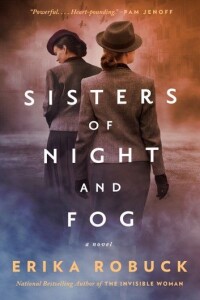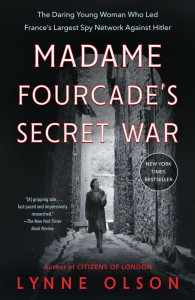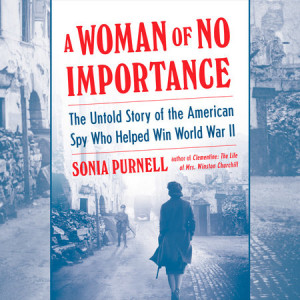
This absorbing historical novel follows two real women who became French Resistance fighters during World War II. Violette Szabo and Virginia d’Albert-Lake both have a history with France. Violette was born there of a French mother and English father and grew up in England to become a strong-willed Cockney. Virginia is an American who, like Violette, falls in love with and marries a Frenchman.
From the start, we are caught up in the rumors of war, brought to life through the eyes of these two women. With the stunning invasion of France, a pregnant Violette in London immediately starts campaigning to do some kind of war work, despite her father’s discouragement, a campaign that takes fire when her husband in killed in North Africa. Meanwhile, Virginia elects to remain in France with her beloved husband, invalided out early in the war.
Alternate chapters follow the two women as they find their way forward, Violette doing various kinds of war work before joining the Special Operations Executive (SOE), a secret UK intelligence agency, in the hopes of being sent to France, Virginia and her husband sheltering and helping downed pilots and escaped POWs.
Beautifully written, full of stunning scenes that we discover in the historical note at the end actually happened, this is one of those books that you simply cannot stop reading. It’s a fantastic addition to our understanding of what was happening beyond the battlefields during this showdown with fascism.
You might think that I would have had enough of women Resistance fighters after reading nonfiction books about Virginia Hall, one of the first British spies in France where she organised Resistance units and provided critical intelligence to the Allies, and Marie-Madeleine Fourcade, who also ran a Resistance operation in France, supplying critical information to MI6, the UK’s Special Intelligence Service. I thought so too until I read reviews of this book by Robuck, whom I know slightly.
Why read yet another book about World War II? One: because this is a story of real people based on Roebuck’s extensive research. Two: because many people don’t realise the role that women played in the war effort, particularly in the Resistance. Three: because it is important to remember the actual horrors of Hitler’s fascist state and the weakness of those who supported and contributed to it. Remembering the heart-breaking realities of fascism is especially critical today when the radical right, funded by amoral one-percenters, are waving swastikas and trying to persuade people in this country to do away with democracy and embrace fascism in order to fulfill their white supremacist dreams and fantasies of a nation with no freedom of religion.
In her Author’s Note, Robuck tells us how Virginia and Violette’s stories came together, “showing the different ways that women, in particular, are called to serve, how each of us has a vocation, and we cannot have peace until we become who we are meant to be. Also, ultimately, they show us that none of us can operate alone. We are all called into a community of people working together for good.”
Virginia and Violette—their courage and integrity—are an inspiration for us all.
Have you read a history—fictionalised or nonfiction—that has inspired you?


